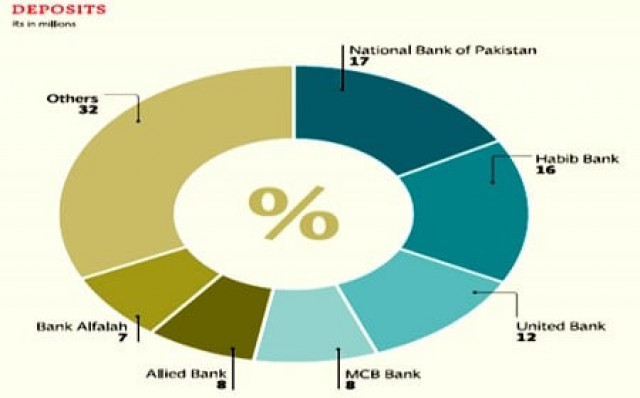Smaller banks continue to face hard times

Analysts expect that consolidation in the industry is inevitable. The smaller banks must either merge, be acquired or face the prospect of bankruptcy. The six largest banks in the country – National Bank, Habib Bank, United Bank, MCB Bank, Allied Bank and Bank Alfalah – have seen their profitability continue to increase over this past quarter, while many of the smaller banks have continued to struggle with losses due to non-performing loans.
“Smaller banks continue to struggle with losses in their lending portfolio,” said Hamza Marath, a banking sector analyst at KASB Securities, a brokerage firm. “We view consolidation as almost inevitable.” They might be giants… The Big Six have not had a particularly stellar record in terms of profitability growth, with only a 3.2% increase in net income during the first quarter of 2010 compared to the same period over the previous year. This after a good year in 2009, when their combined profits grew by 16.6% to Rs64.8 billion.
Their dominance of the banking sector is also diminishing. Taken together, they now command 65.3% of the total deposits of the banking sector, according to their latest financial statements compared to 73.3% at the end of 2004. So why do the smaller banks continue to struggle? The answer lies in part in the fact that many of the medium and small sized banks tried to grow too big too fast. This is not entirely as insane a strategy as it seems. Bank Alfalah aggressively expanded its portfolio to become the sixth largest bank in the country, leapfrogging several banks that had been established for far longer in the Pakistani market.
But it did so at the expense of profitability, expanding both consumer lending and term deposits. This strategy resulted in a sharp spike in non-performing loans towards the end of 2008 and through most of 2009. By then Bank Alfalah had grown large enough to be able to withstand those blows, but just barely. Other banks have not been so lucky. Silkbank seeks to enter the big leagues It seems that Silkbank has decided to grow its way out of trouble.
It has begun offering 11.75% on term deposits at a time when most other banks are not willing to exceed 8%, hoping to attract more deposits and build a lending book that can move it towards profitability again. It is a strategy that may yet work, but it would require the bank to aggressively expand its branch network. It currently only has about 65 branches, compared to the 195 branches of Bank Alfalah, the last bank to successfully attempt the “grow your way to success” strategy. One can only wish them luck. Considering the fact that they made the country give up its finance minister, succeeding seems to be the least they can do.
Published in the Express Tribune, May 18th, 2010.


















COMMENTS
Comments are moderated and generally will be posted if they are on-topic and not abusive.
For more information, please see our Comments FAQ